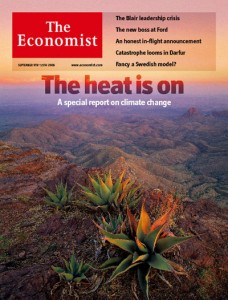Almost all the climate economists in the world now agree. Tax carbon dioxide and do it now.
Since President Obama failed to secure the binding international agreements he so wanted from the International Climate Conference in Paris last month, the U.N. and its allies have another strategy. Leaders who use global warming as a tool for taxing, regulating, and redistributing will never give up, of course, no matter how many times the rest of world balks at destroying economies for dubious environmental improvement.
So last week we heard of a new survey, headlined “95 percent consensus of expert economists: cut carbon pollution.” As the story goes, there is now an overwhelming “consensus among expert climate economists that the U.S. should follow through with its pledges to cut carbon pollution in the wake of the Paris international climate negotiations, and more than three out of four agreed that the U.S. should take action to curb global warming no matter what.”
“No matter what,” in this survey, means the U.S. should act unilaterally to cut emissions, by heavily taxing fossil fuels and their consumers (all of us) — whether or not any other countries do so. This is crucial to the debate, because most Americans understand that acting alone, without the participation of China and India, won’t measurably change world temperatures, and also because those nations and others refused the international binding agreements Obama sought.
So now there is considerable news coverage about this new survey of climate economists, sounding the alarm that the U.S. must lead, whether anyone follows or not. One question is strangely missing from all the news reports, though: What in the world is a climate economist?Traditionally, climatologists and meteorologists have science degrees (BS), whereas economists have degrees in the arts (BA). There are a handful of exceptions. Some schools offering economics degrees called BEc, BEconSc, BA(Econ), BSc(Econ), BSSc(Econ) or BBA(Econ). No need to decipher all the alphabet soup that defines university jargon these days; in general economics is a social science, frequently taught in the business school. Typical courses for the degree include microeconomics, macroeconomics, econometrics, economic statistics, history of economic thought, and political economics. Students can specialize in fields like applied economics, financial economics, mathematical economics and political economy. Australian National University offers a master’s in Climate Change and the University of Dundee offers one in Climate Change Economics and Policy, both degrees in social sciences, not science.
Climate scientists are not economists, and economists are not scientists. For some reason, these distinctions seem lost on many observers, but they matter a great deal — if we believe sound public policy on such technical issues should be based on sound science, not political opinions. Of course, there is nothing new about opinionated activists pretending a scientific expertise they don’t have. Two of the world’s leading advocates for global warming alarmism, Al Gore and Prince Charles, earned their college degrees in government/law and art history, respectively. That doesn’t mean they aren’t entitled to their opinions, nor do we deny actual educated and trained scientists the right to express political views. But we shouldn’t confuse opinions with expertise, in either case.
These lines have become so blurred that “climate economist” is actually a thing now. So is “veterinary physicist.” There are several of each known to exist. But they are not yet professions with thousands of practitioners, from whom we take policy direction on some of the most important issues facing mankind. Nor do we consult “astrological horticulturists” to determine when we pick peaches in the orchard.
Don’t get me wrong; there are lots of interesting job titles. Some sound oxymoronic, such as “modern historian,” “executive assistant,” “student teacher,” or “crisis manager.” Others just make us want to know more: I have friend who is a “forensic accountant,” for example, ferreting out crimes through financial auditing. But those are actual jobs, with specific training and education.
You can’t really be an “oral history writer” or a “mathematical biologist” any more than you can be an “uninvited guest,” a “devout atheist” or a “hopeless optimist.” When I was little I wanted to be a “Tinkertoy engineer.” But for now, I’ll go back to my “home office” fill another cup of coffee, complete with “non-dairy creamer,” and write a “detailed summary.”
Here is the long and short of it: if this climate argument is really about the environment, we ought to get our facts from actual scientists. But if we are taking direction from economists, does that mean it is really about money?
(A version of this column originally appeared in the Grand Junction Daily Sentinel, January 29, 2016)





Comments on this entry are closed.